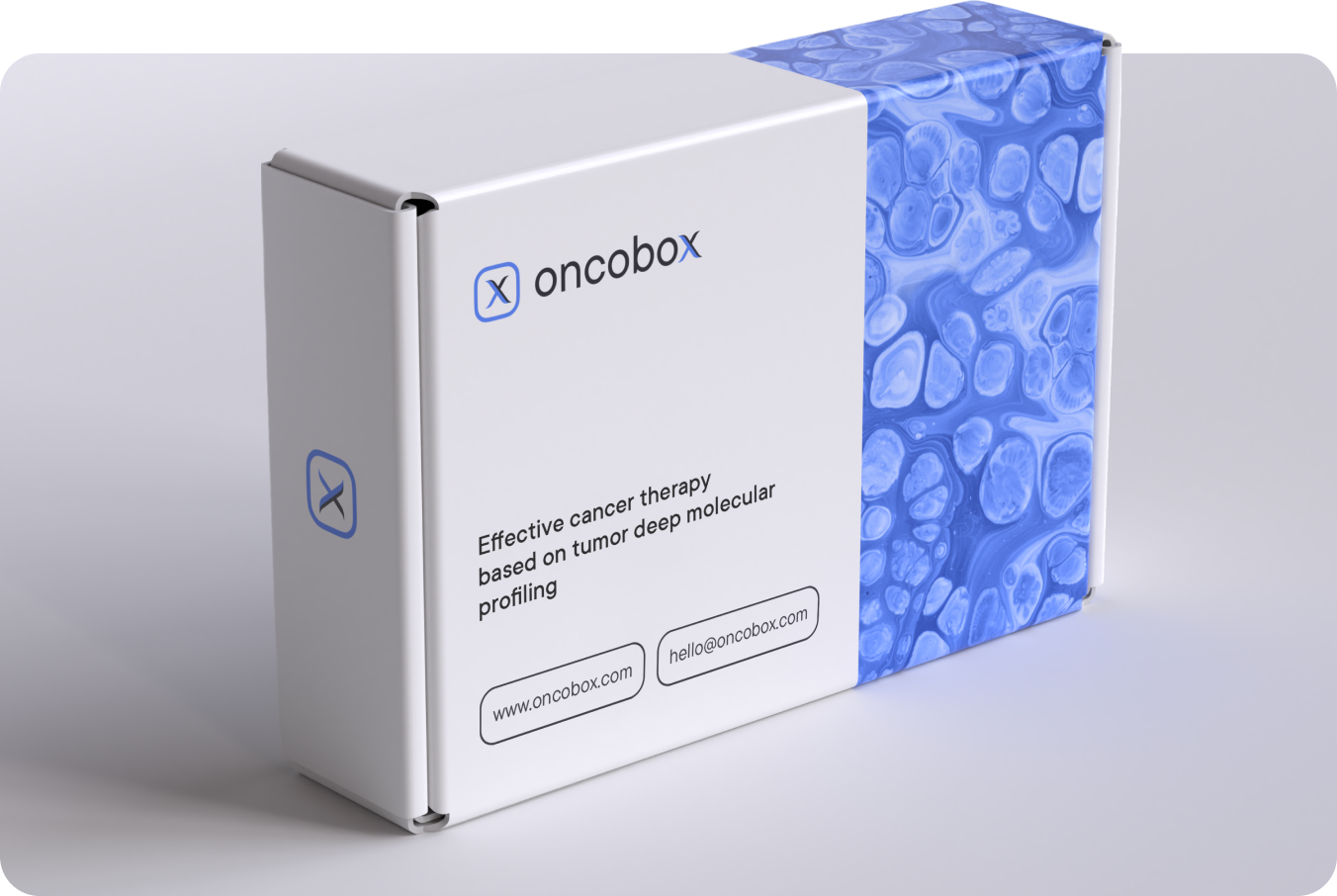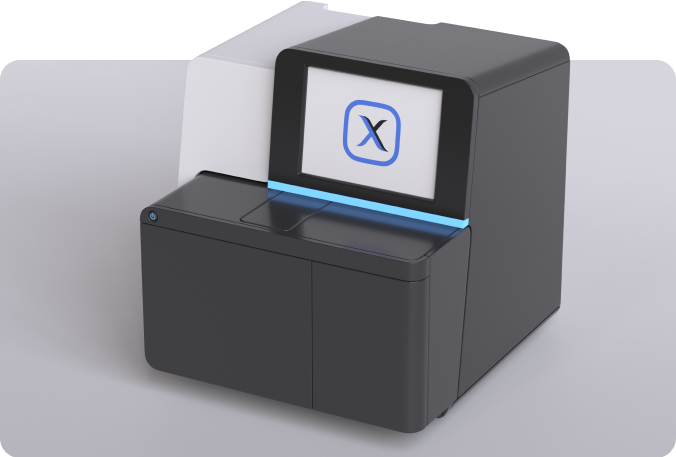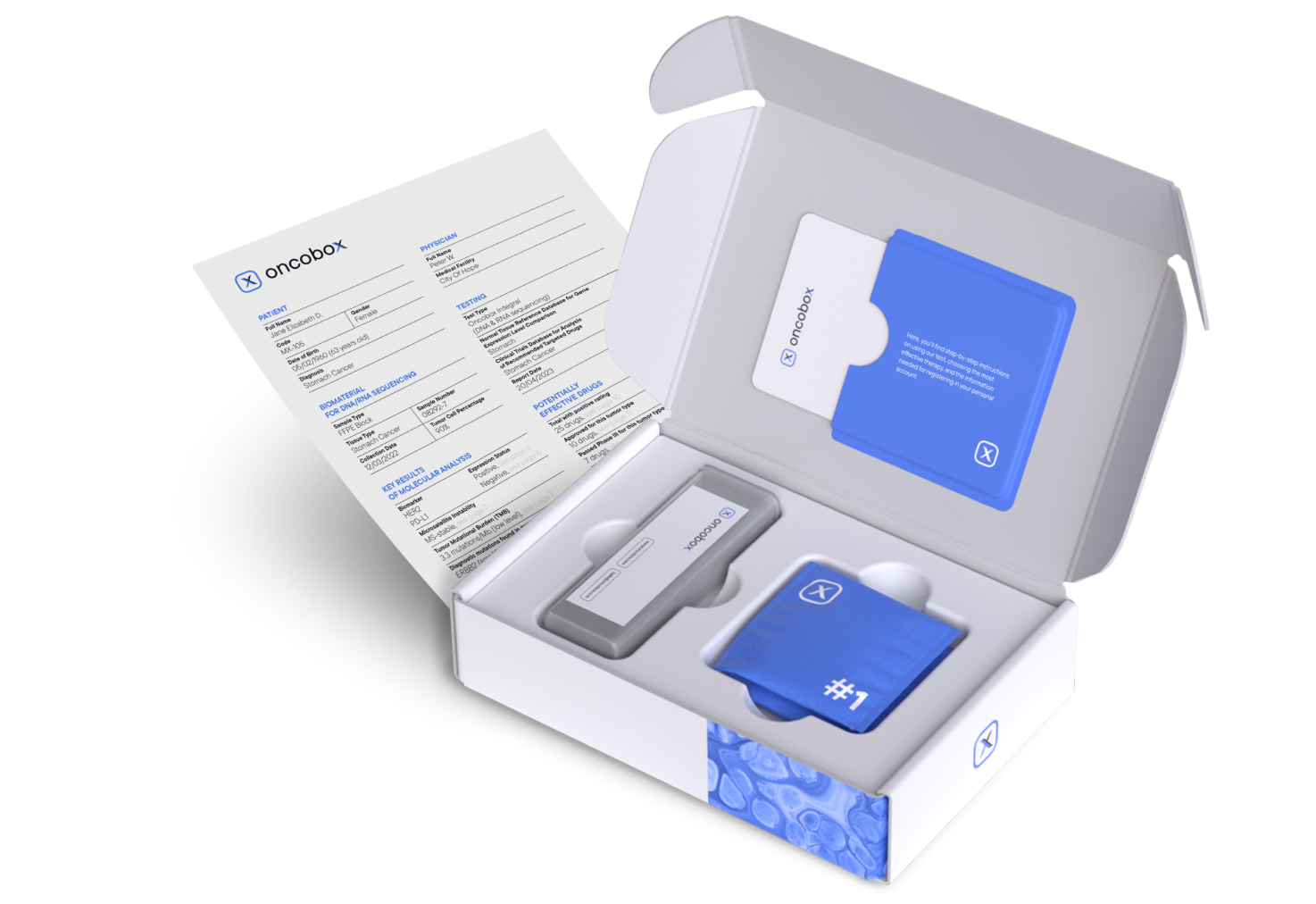



Effective cancer therapy
based on tumor deep molecular profiling
based on tumor deep molecular profiling

Every tumor is unique, and at Oncobox, we've pioneered a groundbreaking solution to ensure the treatment is as exceptional as each individual.
Oncobox Dx considers all molecular nuances of a tumor and evaluates the effectiveness of 170 novel targeted and immunotherapy drugs, assisting the healthcare provider in crafting a highly effective treatment plan.
Let's elevate cancer care with unparalleled precision.
Oncobox Dx considers all molecular nuances of a tumor and evaluates the effectiveness of 170 novel targeted and immunotherapy drugs, assisting the healthcare provider in crafting a highly effective treatment plan.
Let's elevate cancer care with unparalleled precision.






You can access Oncobox testing by consulting with an oncologist at one of our affiliated clinics. This process typically involves sending a tumor sample to our laboratory for comprehensive genomic profiling.
01
The report provides a detailed list of molecular abnormalities, ranks the drugs accordingly, and includes outcomes from clinical trials. This information empowers the physician or medical board to devise the most effective treatment strategy.
03
The testing includes analysis of changes in DNA and RNA obtained from a tumor sample. Oncobox predicts the efficacy of over 170 targeted and immunotherapeutic drugs and generates a personalized drug ranking tailored to the specific patient.
02



Clinical efficacy of
Oncobox Dx
Oncobox Dx










ovarian cancer
Female, 40 years
The patient underwent six surgeries, and after the latest recurrence, the tumor was deemed inoperable. Chemotherapy and hormone therapy attempts for two years proved ineffective, with further tumor progression noted. In 2016, the list of recommended drugs was fully exhausted, and DNA diagnostics (mutation analysis) did not identify any potentially effective targeted drugs.

Continue reading on:

The patient underwent six surgeries, and after the latest recurrence, the tumor was deemed inoperable. Chemotherapy and hormone therapy attempts for two years proved ineffective, with further tumor progression noted. In 2016, the list of recommended drugs was fully exhausted, and DNA diagnostics (mutation analysis) did not identify any potentially effective targeted drugs.
Based on the comprehensive results from Oncobox Dx, a tyrosine kinase inhibitor (Sorafenib) was prescribed. There was a partial response to treatment with a significant reduction in tumor size, but the treatment was discontinued due to side effects. Additionally, a drug with a different mechanism of action (Imatinib) was selected, and a substantial reduction in tumor size over six months of treatment allowed for complete surgical removal. As of February 2021, the patient continues her treatment with no side effects and no signs of recurrence.


Continue reading on:
Oncobox analysis generated a list of potentially actionable compounds, which when used clinically lead to partial response and later long-term stabilization of the patient’s disease.
Based on the comprehensive results from Oncobox Dx, a tyrosine kinase inhibitor (Sorafenib) was prescribed. There was a partial response to treatment with a significant reduction in tumor size, but the treatment was discontinued due to side effects. Additionally, a drug with a different mechanism of action (Imatinib) was selected, and a substantial reduction in tumor size over six months of treatment allowed for complete surgical removal. As of February 2021, the patient continues her treatment with no side effects and no signs of recurrence.








lung cancer
Male, 48 years
The patient underwent surgery and four subsequent courses of chemotherapy (Vinorelbine + Cisplatin). After eight months, brain metastases were discovered. He underwent radiation therapy, followed by receiving Ceritinib. After 21 months, cancer progression and the growth of brain metastases were detected. Over the next six months, the patient underwent three more varied treatments and received radio-surgery (cyberknife), but his condition continued to worsen, and new lung metastases were revealed.
Based on the Oncobox Dx results, a treatment regimen, including an ALK inhibitor, an angiogenesis inhibitor, and taxanes (Crizotinib + Bevacizumab + Docetaxel), was prescribed. The treatment resulted in a significant improvement in the patient's condition and a progression-free survival of 2 years.

Continue reading on:


The patient underwent surgery and four subsequent courses of chemotherapy (Vinorelbine + Cisplatin). After eight months, brain metastases were discovered. He underwent radiation therapy, followed by receiving Ceritinib. After 21 months, cancer progression and the growth of brain metastases were detected. Over the next six months, the patient underwent three more varied treatments and received radio-surgery (cyberknife), but his condition continued to worsen, and new lung metastases were revealed.
Based on the Oncobox Dx results, a treatment regimen, including an ALK inhibitor, an angiogenesis inhibitor, and taxanes (Crizotinib + Bevacizumab + Docetaxel), was prescribed. The treatment resulted in a significant improvement in the patient's condition and a progression-free survival of 2 years.


Continue reading on:
Survival of our patient after developing resistance to ALK inhibitor was longer for 16 months than previously reported average survival for such cases.








stomach cancer
Female, 79 years
The patient initially underwent chemotherapy (FOLFOX and FLOT regimens), which initially led to a reduction in tumor size. However, soon thereafter, she developed drug tolerance with no changes in tumor size. Doctors decided to switch to another treatment regimen.
Based on the Oncobox Dx results using the molecular profile of the tumor, a high response to immunotherapy was predicted. Oncologist decided to stop chemotherapy and proceed with surgery. After that, the patient received immunotherapy (Pembrolizumab) for 6 months, resulting in complete remission. No signs of recurrence have been observed for 2 years since starting immunotherapy.

Continue reading on:


The patient initially underwent chemotherapy (FOLFOX and FLOT regimens), which initially led to a reduction in tumor size. However, soon thereafter, she developed drug tolerance with no changes in tumor size. Doctors decided to switch to another treatment regimen.
Based on the Oncobox Dx results using the molecular profile of the tumor, a high response to immunotherapy was predicted. Oncologist decided to stop chemotherapy and proceed with surgery. After that, the patient received immunotherapy (Pembrolizumab) for 6 months, resulting in complete remission. No signs of recurrence have been observed for 2 years since starting immunotherapy.


Continue reading on:
"According to Oncobox results, the patient received immunotherapy with anti-PD1 therapy and is now free of disease for 2 years."








cholangiocarcinoma
Male, 72 years
The patient received four courses of chemotherapy (2 courses of Gemcitabine + Cisplatin followed by 2 courses of Gemcitabine + Capecitabine). Despite adherence to clinical guidelines for treatment, tumor progression was observed, and the patient's condition worsened.
Based on the comprehensive Oncobox Dx results, a tyrosine kinase inhibitor (Sorafenib) was prescribed. Sorafenib monotherapy led to tumor stabilization and significant pain reduction. After 6 months, tumor progression was detected, and the patient was prescribed another tyrosine kinase inhibitor (Pazopanib), also selected by Oncobox. This change in the treatment regimen alleviated the side effects of Sorafenib, improved the patient's condition, and showed positive changes in lab test results. Worldwide statistics indicate that the survival rate for cholangiocarcinoma patients is typically no more than 6 months. However, thanks to personalized treatment selection by Oncobox, the patient lived for more than two years and maintained physical activity.

Continue reading on:

The patient received four courses of chemotherapy (2 courses of Gemcitabine + Cisplatin followed by 2 courses of Gemcitabine + Capecitabine). Despite adherence to clinical guidelines for treatment, tumor progression was observed, and the patient's condition worsened.
Based on the comprehensive Oncobox Dx results, a tyrosine kinase inhibitor (Sorafenib) was prescribed. Sorafenib monotherapy led to tumor stabilization and significant pain reduction. After 6 months, tumor progression was detected, and the patient was prescribed another tyrosine kinase inhibitor (Pazopanib), also selected by Oncobox. This change in the treatment regimen alleviated the side effects of Sorafenib, improved the patient's condition, and showed positive changes in lab test results. Worldwide statistics indicate that the survival rate for cholangiocarcinoma patients is typically no more than 6 months. However, thanks to personalized treatment selection by Oncobox, the patient lived for more than two years and maintained physical activity.


Continue reading on:
"After 2 years from the diagnosis of MCC the patient was alive and physically active, which is substantially longer than median survival for standard therapy."





The effectiveness of Oncobox technology has been validated through both retrospective and prospective clinical studies. In these trials, hundreds of late-stage cancer patients received personalized recommendations for targeted drugs based on their individual DNA & RNA profiling and Oncobox ratings, demonstrating the clinical impact of our solution.






Learn more about
Oncobox
Oncobox

Join us in pushing the boundaries of clinical and research development. From groundbreaking clinical trials to pioneering biomarker and CDx advancements, we're dedicated to transforming cancer care and improving patient outcomes. Ready to make a difference? Reach out and let's collaborate!


2015
2017
2018
2020
2023
Company Inception
Y Combinator
Diagnostic Platform Launch & Key Research Publication
Unique Biobank Collection & Clinical Trials Launch
Clinical Trial Completion &
US Patent Acquisition
US Patent Acquisition
Founded with the mission to revolutionize the field of precision oncology, leveraging cutting-edge system biology and omics technologies.
A major milestone for the company, highlighting its pioneering efforts in oncodiagnostics and greatly accelerating its business development.
Introduced a platform that enhances the precision of cancer treatment. A paper in Seminars in Cancer Biology detailed its scientific principles and efficacy.
Obtained unique gene expression profiles from healthy tissues, partially published in Nature Scientific Data. Initiated a multicentral prospective clinical trial.
Concluded a prospective trial with 250 patients, yielding promising results, with publication preparation underway. Additionally, secured a patent from the USPTO.









News
Oncobox will present the findings of a prospective clinical trial NCT03724097 on the prescription of anticancer drugs using RNA sequencing and the Oncobox platform at the WIN Symposium, endorsed by ASCO, in Abu Dhabi, UAE, on March 1, 2024.
WIN Symposium 2024: Results of Prospective Clinical Study
Oncobox has been granted a U.S. patent for the advanced genetic information analysis platform! This milestone not only underscores our commitment to innovation in personalized medicine but also sets a new standard in genetic diagnostics using RNA.
Pioneered a machine learning approach to identify gene markers that predict the effectiveness of bortezomib in treating multiple myeloma. This breakthrough, featuring key biomarkers like FGFR3 and MAF, promises more tailored and effective treatments for this widespread cancer in the elderly.
Oncobox Secures US Patent for Cutting-Edge Genetic Platform
Oncobox Unveils ML-Powered Breakthrough in Myeloma Therapy
15 February 2024
20 April 2023
06 November 2022



































